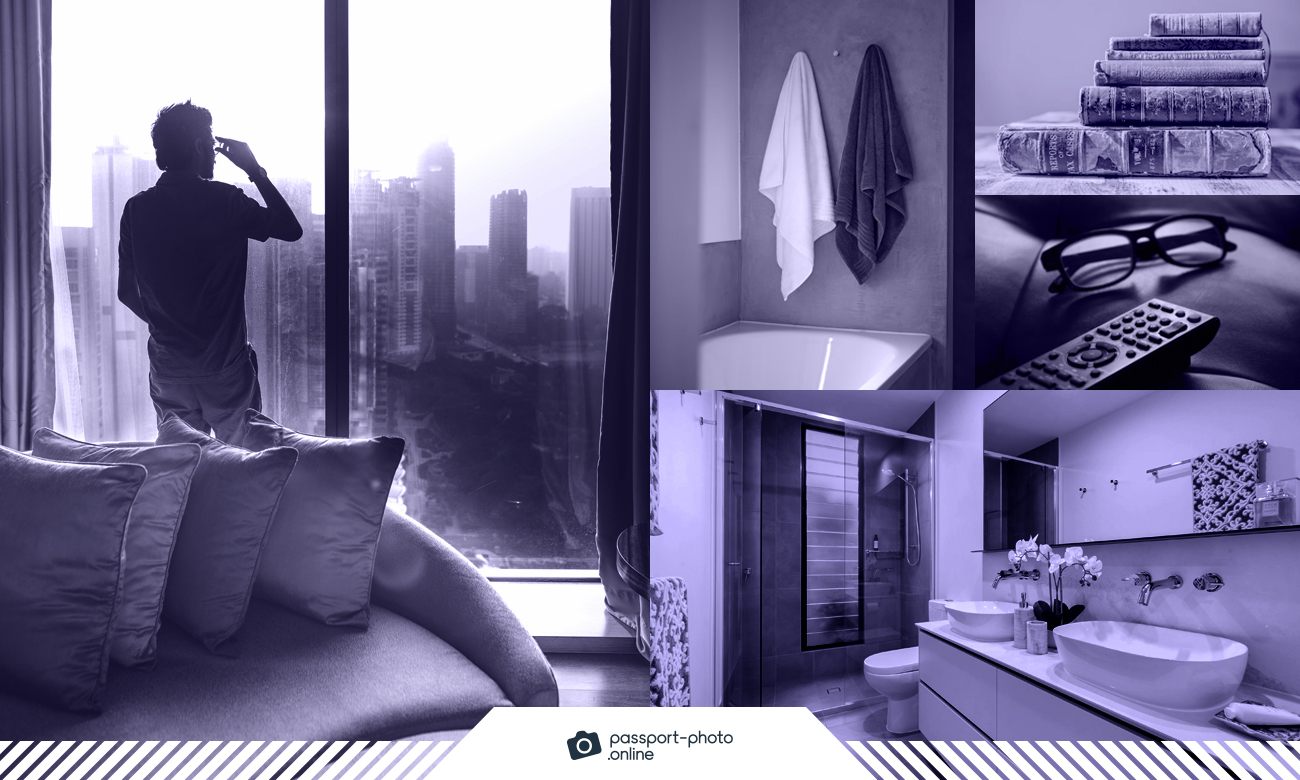One soap bar here, a few mini shampoo bottles there.
Most of us have left a hotel with more items than when we checked in. Accidentally or not, it happens.
But just how often?
To find out, we’ve surveyed 1,000+ Americans about their stealing endeavors. We’ll also shed some light on what people usually take from hotels, what drives them, and much more.
Ready to roll?
Key Takeaways
- A full 87% of guests admit they’ve taken something from a hotel room at least once in their lifetime.
- About a quarter of Americans (26%) commit petty hotel theft during their every stay.
- People justify taking things from hotels, often citing the price they paid for the accommodation (30%) and sentimental reasons (29%).
- Properties usually charge for swiped items (35%) when they catch someone.
- Most Americans consider bathroom accessories acceptable to swipe (32%), followed by toiletries (27%) and mini-bar contents (26%).
- The TOP three stolen items are towels (35%), soap dishes (35%), and tissue boxes (34%).
- Nearly 90% of people discuss their stealing endeavors with friends.
Most Americans Steal from Hotels
Let’s cut to the chase:
When we asked survey participants, “Have you personally ever taken anything from a hotel?” 87% answered positively.
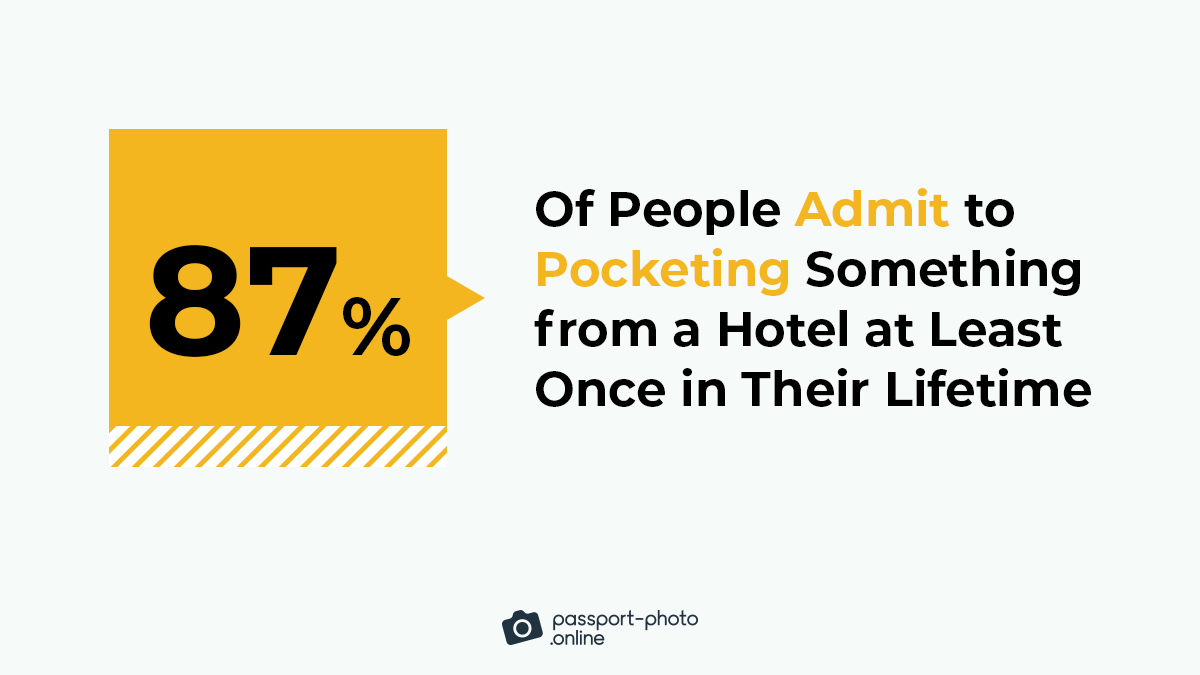
Surprisingly, the youngest generation dragged the average down: only 80% of 25-year-olds admitted to it.
So, who takes the lead?
That honor goes to hotel guests aged 55+. Over 90% of them put their hands up and said, “Guilty!”
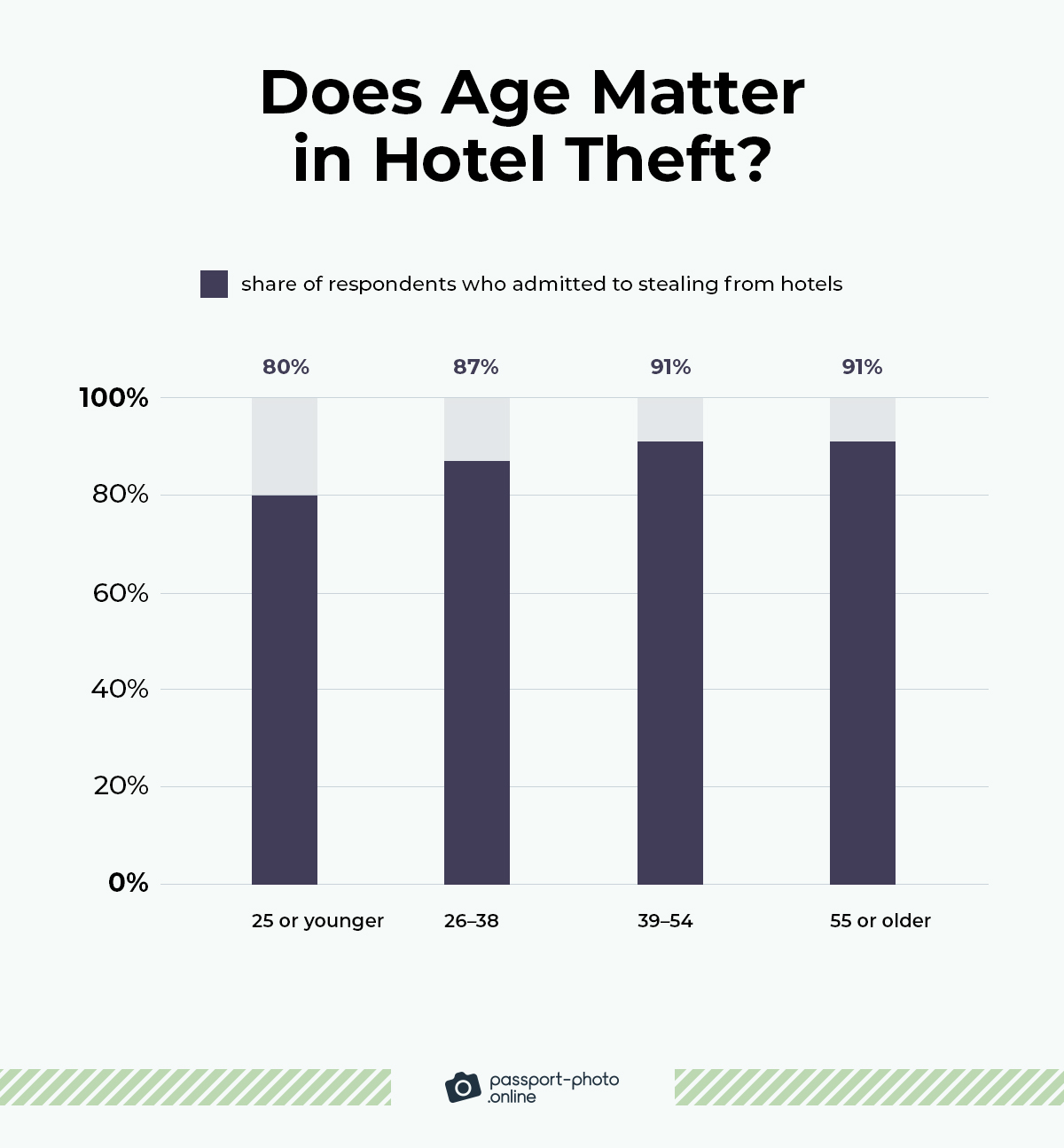
But that’s not all.
Upon closer data examination, we found that men get sticky fingers slightly more often than women: 89% vs. 84%.
Is that because men are generally more audacious? We leave that to you to judge.
Hotel Guests Usually Steal Because They Think They Deserve It
Let’s look into what drives people to take borrow things (without permission).
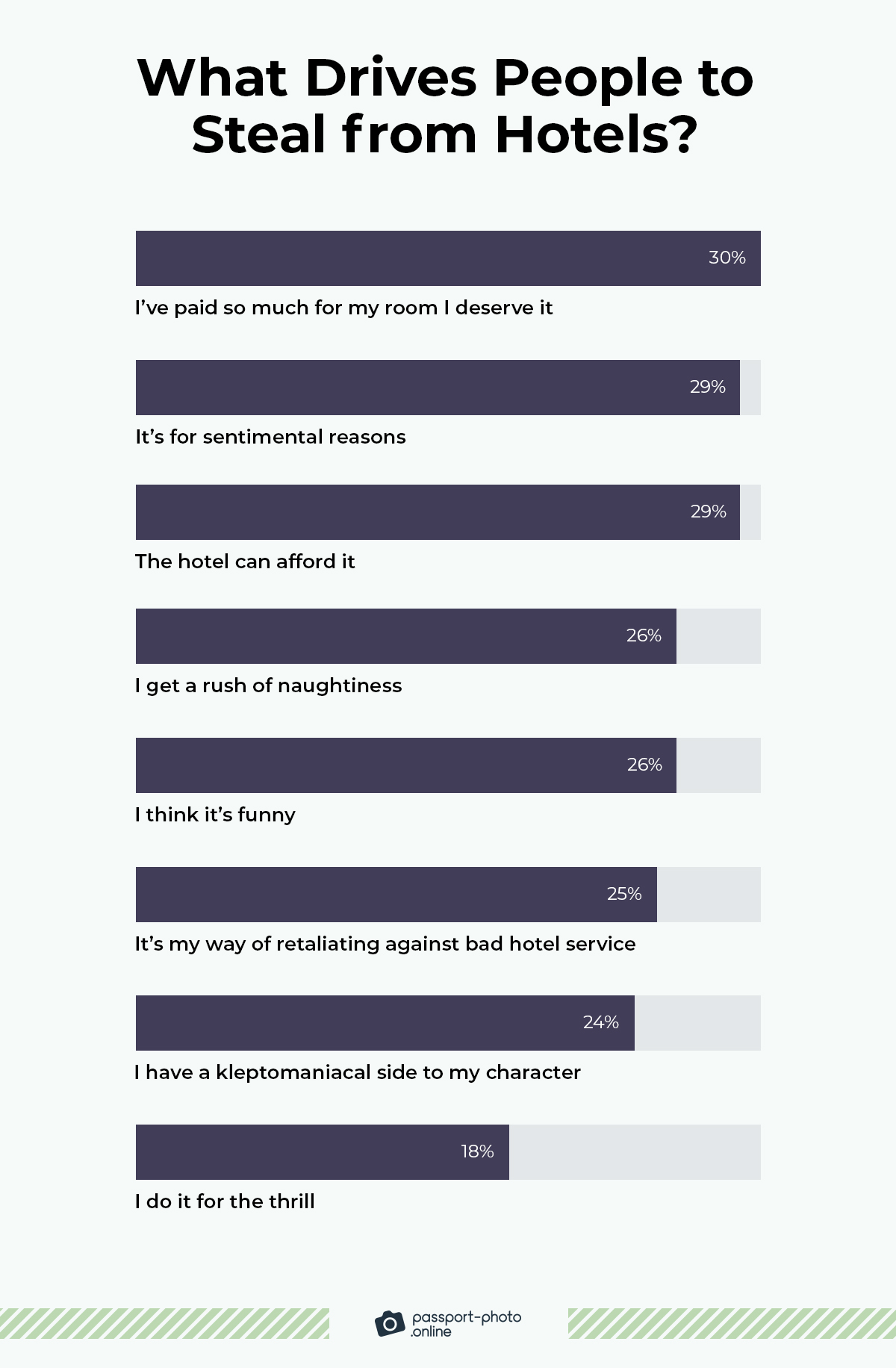
The “I think I deserve it” takes the cake here, with “sentimental reasons” and “the hotel can afford it” being pretty much head-to-head.
But a different picture emerges when we shift our focus to the respondents who usually stay at 2-star hotels:
- 30% of them get sticky fingers to retaliate against poor service.
- 26% do it because they have a kleptomaniacal side to their character.
- 25% succumb to a rush of naughtiness.
That significantly differs from the survey participants, who typically pick more expensive hotels (three, four, and five stars). As the chart above shows, they’re mainly motivated by economic and sentimental reasons.
Is service in 2-star hotels so bad that it calls for petty theft?

Do you need passport photos? Find out more:
People Get Caught Quite Often
When you steal, there’s got to be this one time you get caught: 80% of our respondents prove it.
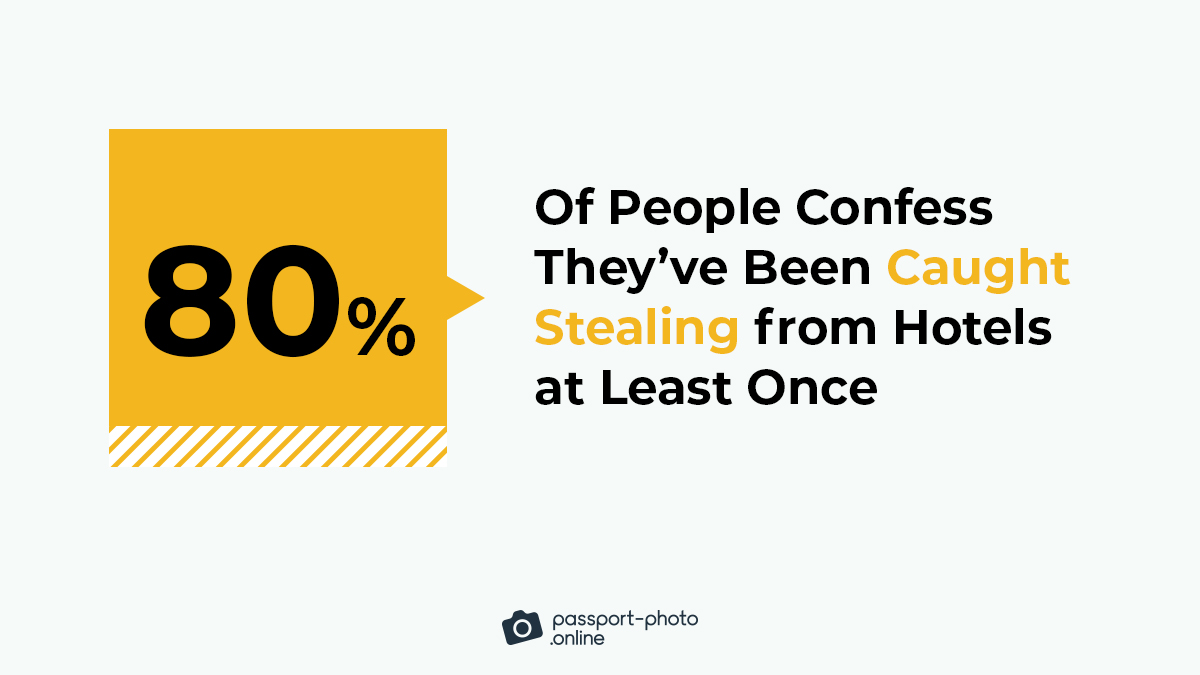
How come it’s so many?
Frankly, there’s more than one possible explanation.
We asked the question in the context of life experiences. Therefore, even a rare event, such as getting caught stealing, may happen to many of us over time.
Plus, getting caught can be interpreted in many different ways.
For some, it could mean their travel companion noticed the extra slippers in the luggage. For others, it’s actually getting busted by hotel staff.
Regardless of how the cat got out of the bag, the morally-questionable deeds of eight in 10 Americans have been noticed at least once.
With that in mind, let’s look at the below chart where things get twisted even more.
| Age Group | Share of Respondents Who Got Caught Stealing from a Hotel |
|---|---|
| 25 or younger | 84% |
| 26–38 | 82% |
| 39–54 | 80% |
| 55 or older | 62% |
Can you see it?
It’s the 55+ folks who get away most of the time. Perhaps it’s a skill that comes with age and experience.
Or is it?
Baby Boomers, what other secrets do you hold?
Guests Don’t Typically Face the Music
In this next section, we asked Americans caught pocketing from hotels what consequences they faced.
Have a look:
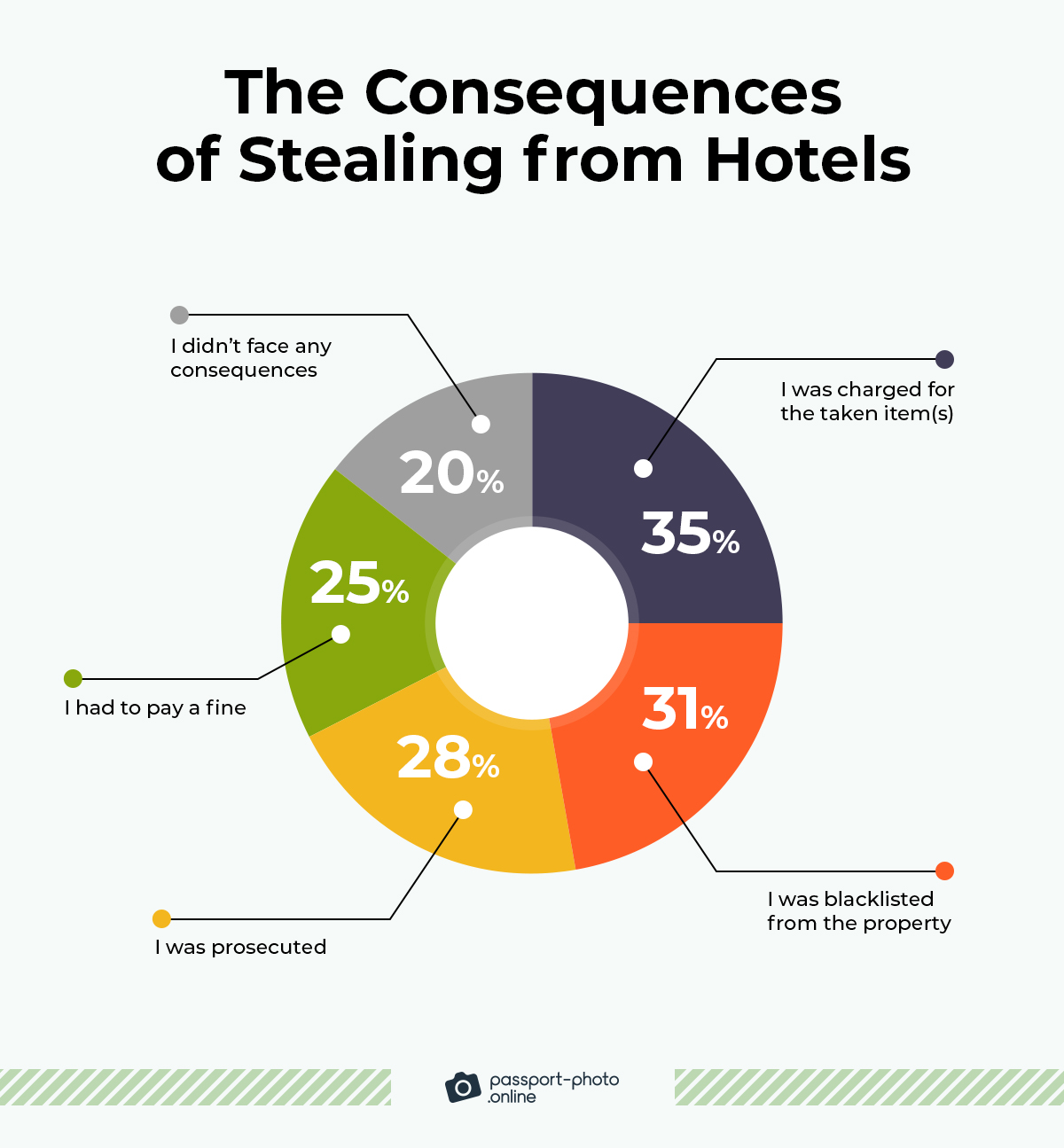
When we took a deeper dive into the data, we found that regardless of the hotel class survey respondents typically choose, most properties make you pay for stolen items if caught.
But curious things start emerging (again!) when we look at age groups:
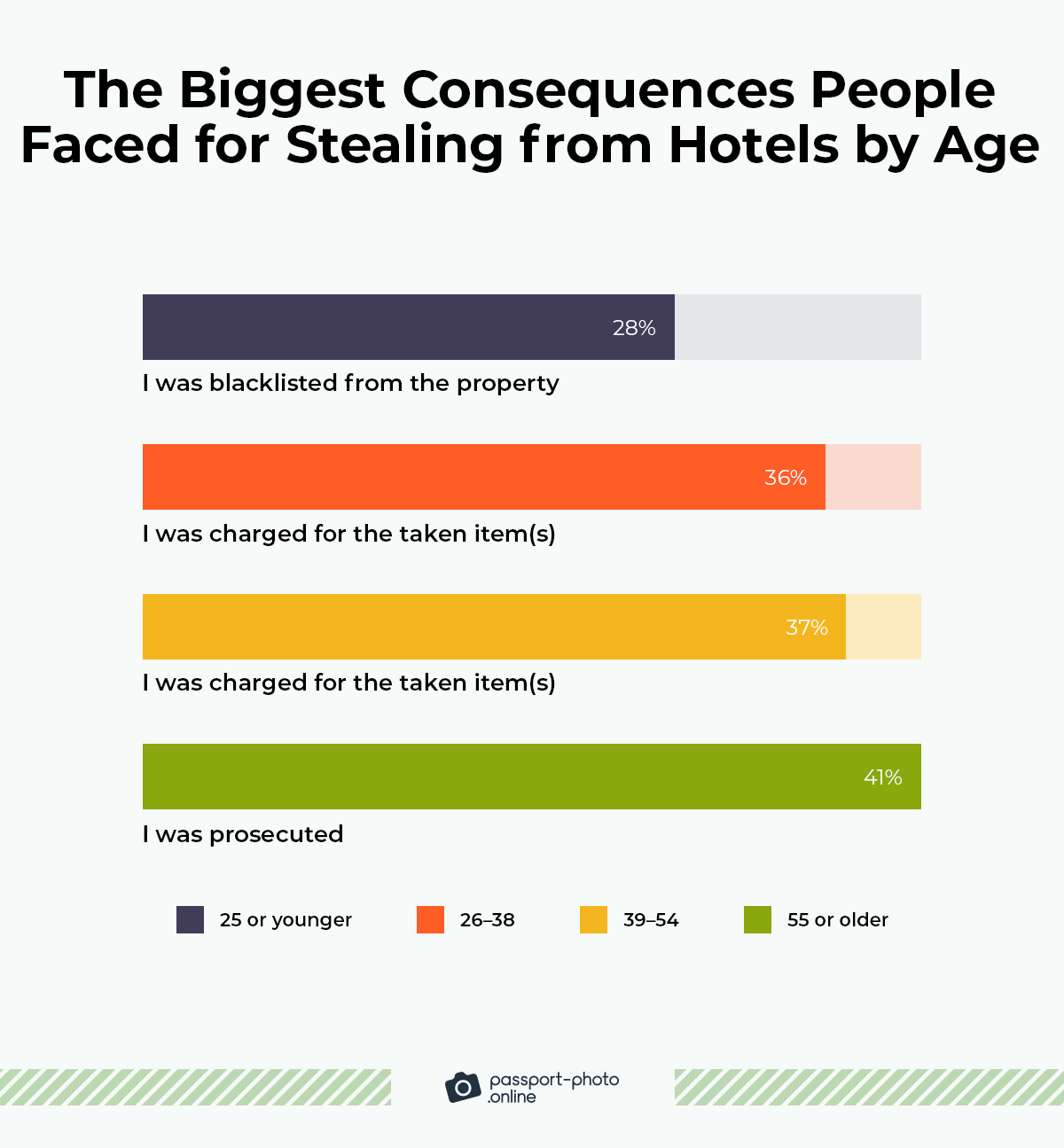
The takeaway?
Hotels tend to blacklist young folks for their endeavors, whereas Baby Boomers usually face prosecution charges.
Why so?
We aren’t exactly sure. But here’s an idea:
When going through your early twenties, you don’t exactly throw cash left and right. So, it’s possible that young folks want to avoid paying for pocketed items and end up banned.
As far as 55+ respondents are concerned, perhaps back in the day, prosecution charges were considered a much more effective method of discouraging petty theft.
We’d love to know your take on this. If you’ve ever taken anything from a hotel and faced the music, let us know how it went down in the comments.
Americans Regret Stealing from Hotels
There’s some good news, though—
About 84% of Americans say they regret taking something from a hotel.
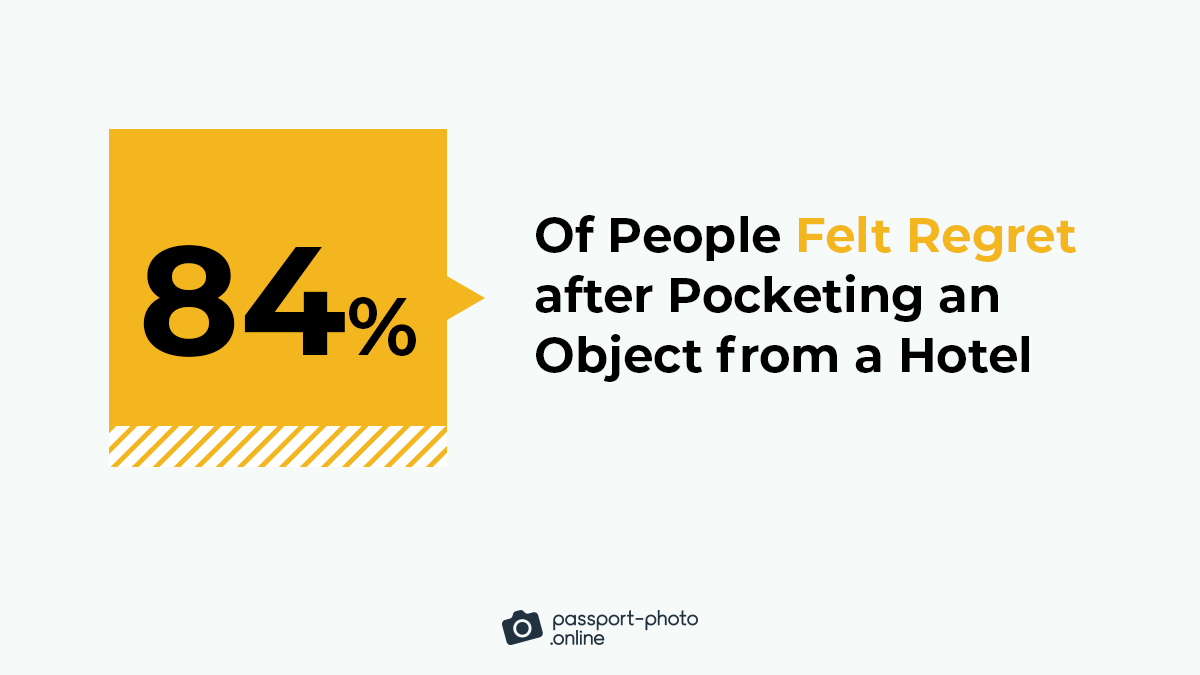
That means most people take stock of their actions and feel remorseful for misdeeds.
How does that correlate with how often we steal?
Scroll on.
A Big Chunk of Americans Admit They Always Filch
Moving along, we wanted to see how often guests get sticky fingers.
Does feeling regretful or fear of getting caught prevent Americans from relapsing into petty theft? We’d say, meeh.
See the results yourself:
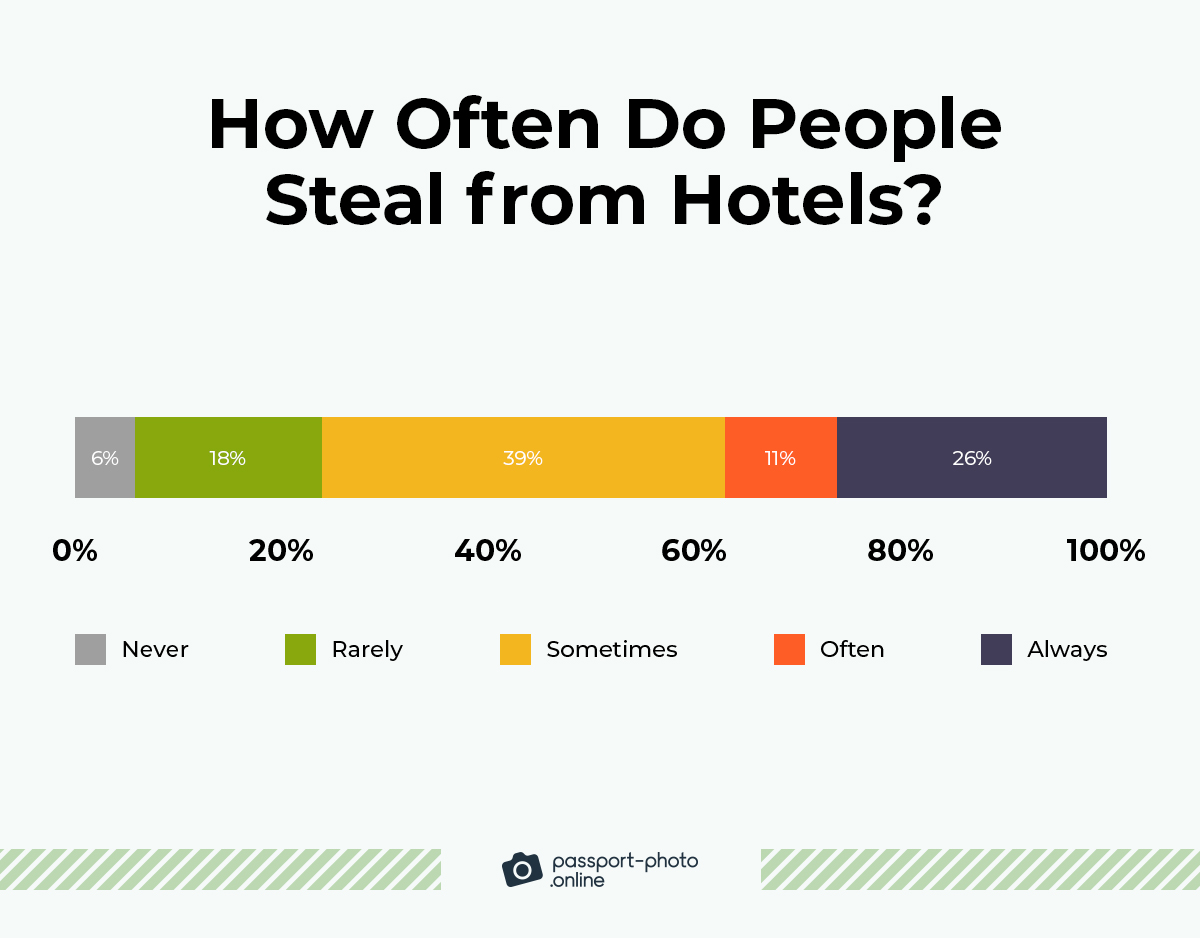
With such a big chunk of people who say they always “borrow” things from hotels, it’s doubtful that the potential consequences or regrets are a strong enough deterrent.
But wait, there’s more.
Look at how different age groups responded to the above question, “How often do you take something from a hotel during travels?”:
| Age Group | Share of Respondents Who Claim They Always Steal | Share of Respondents Who Claim They Never Steal |
|---|---|---|
| 25 or younger | 17% | 7% |
| 26–38 | 25% | 6% |
| 39–54 | 33% | 4% |
| 55 or older | 34% | 0% |
Is there a little thief growing inside us over the years? Perhaps younger generations aren’t as bad as some might think.
Americans Have No Problem Admitting to Petty Hotel Theft
Think back to your last petty hotel theft. Did you tell anybody about it?
Our respondents did: 90% admit they typically discuss their misdeeds with friends.
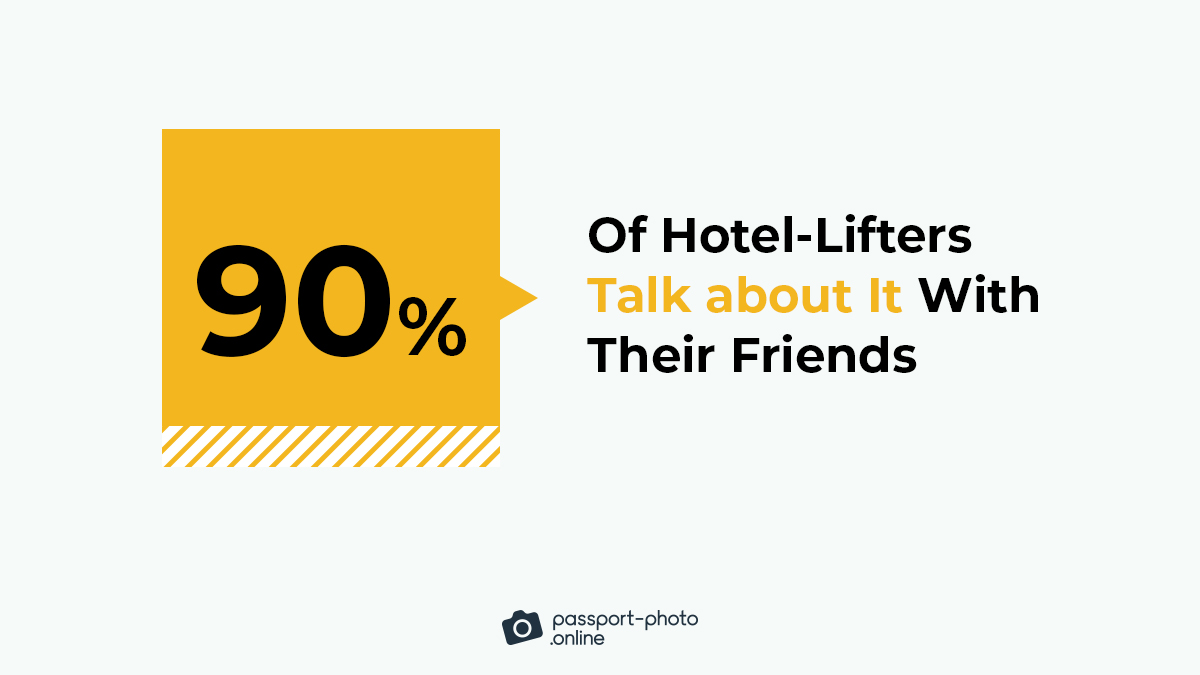
That’s a small slice of honesty right there.
What Do We Take From Hotels?
So far, so good.
We now know about petty hotel theft. But what is it that people pack in their suitcases right before check-out?
Before we get to this burning question, let’s first zero in on what Americans think is acceptable to take from a hotel:
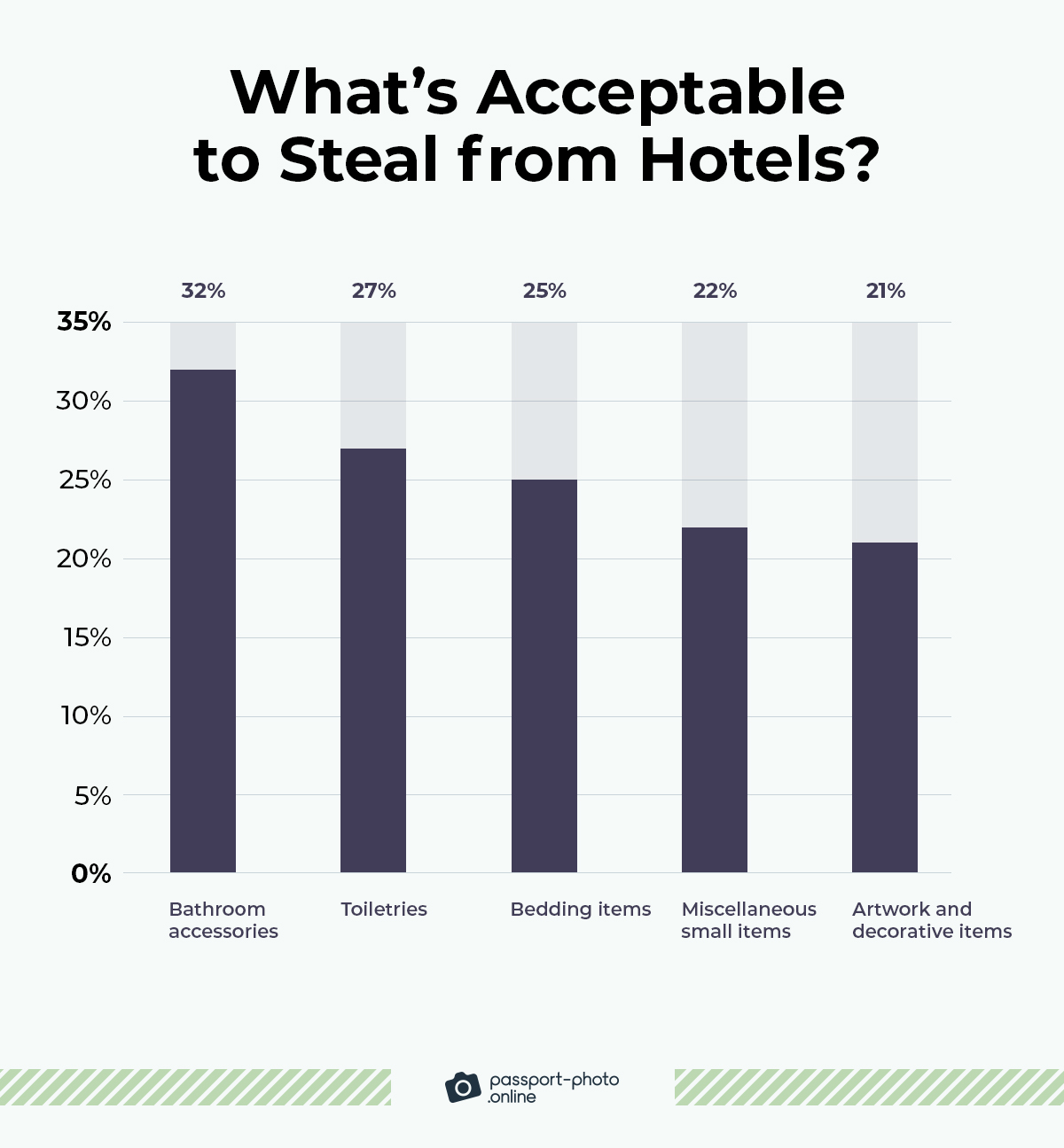
Now, does your moral compass point in the same direction?
Most Commonly Taken Items: Ranked
All in all, we gave survey respondents a list of 75+ different items across 10 categories and asked which ones they’d taken in their lifetime. We’ll not drown you in data presenting all the results.
Instead, we’ll show you the most-commonly stolen hotel items.
Some are precisely what you’d expect, while others might come as a surprise.
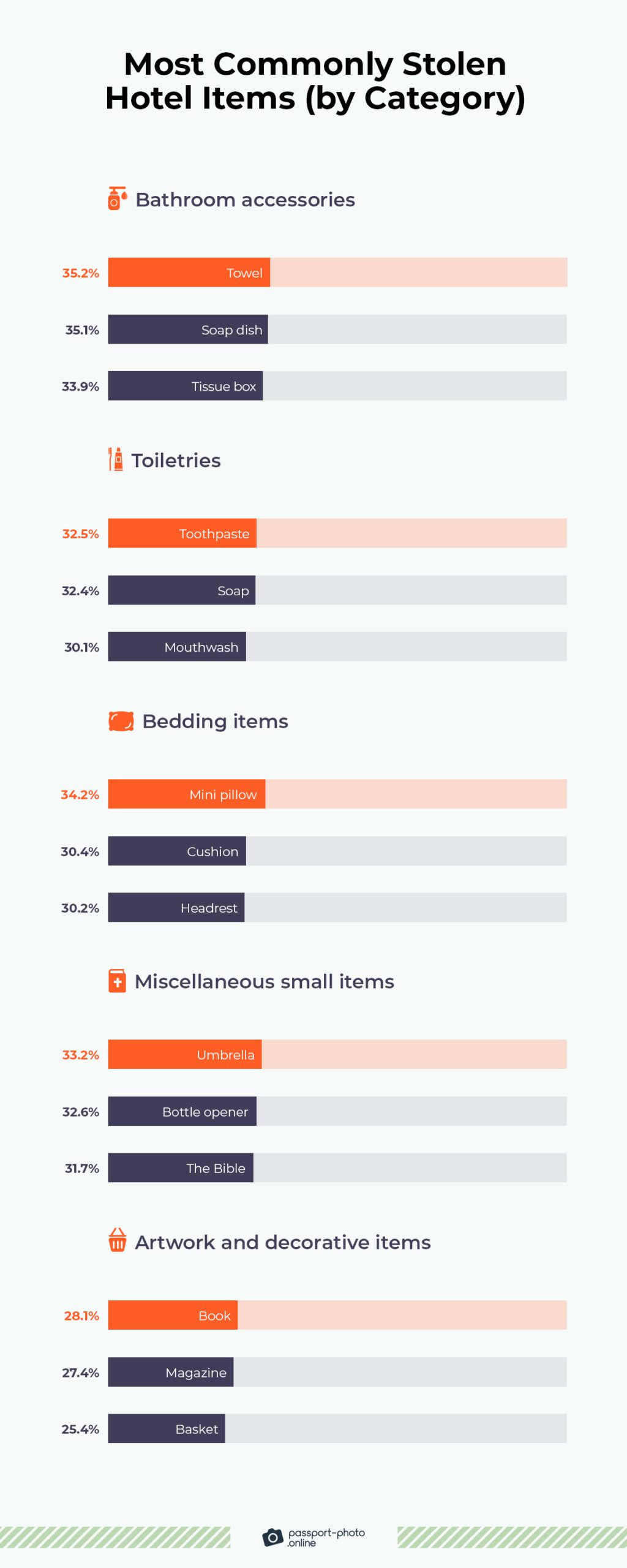
As you can see, people usually pocket disposables like soap, mouthwash, or toothpaste.
Things start to look more ethically challenged as we go down the list.
Towels, hair dryers, or mini pillows are not single-use. Packing one of those in your bag may not be so morally gray.
So think twice before you help yourself to a “souvenir” during your next stay.
Can You Put an End to Petty Hotel Theft?
Lastly, we wanted to experiment a little.
We thought: is there anything hotels could do to lower petty theft? Our data shows neither fear of getting caught nor moral deterrents are strong enough.
Then it hit us.
What if hotels talked to people by placing special notes in rooms?
Just imagine this—
You walk into your room and look around. Below the TV is a little bowl with candy and a note.
The note has a message that’s supposed to discourage people from stealing.
Now, the question is: could it work?
So, we came up with seven different messages and put them to the test. We asked respondents to indicate how likely a given written request was to discourage them from petty theft.
Here are the results:
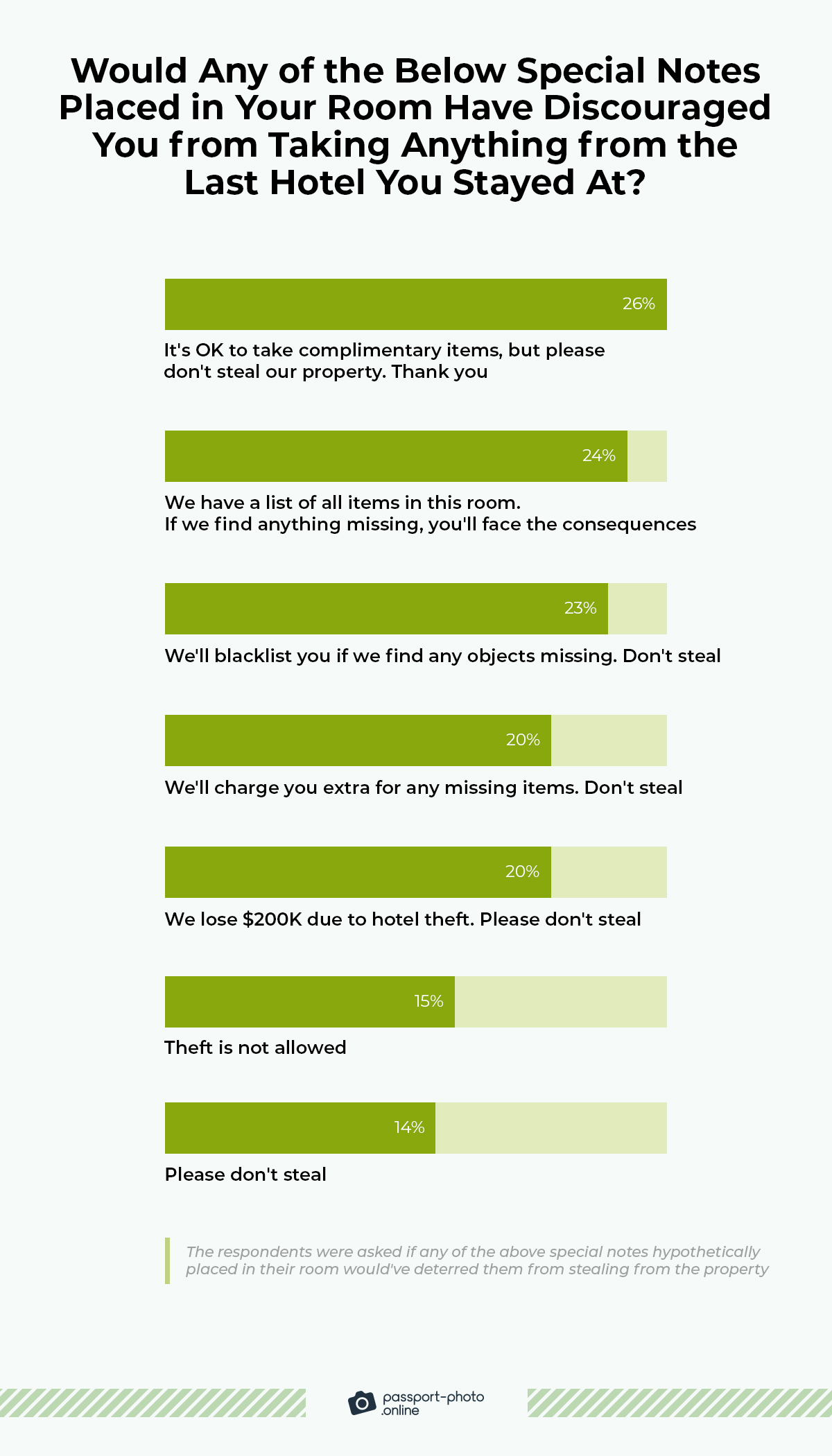
But there’s more.
Every Coin Has a Flip Side
Every action has a reaction, right?
If you tell hotel guests they’re being supervised, they won’t like it.
As a result, hotels will lose customers.
So the key is to strike a good balance between being customer-friendly and preventing petty theft.
To verify that, we asked our survey respondents to indicate how likely they were to return to a hotel that placed different anti-theft notes in rooms.
Have a look:
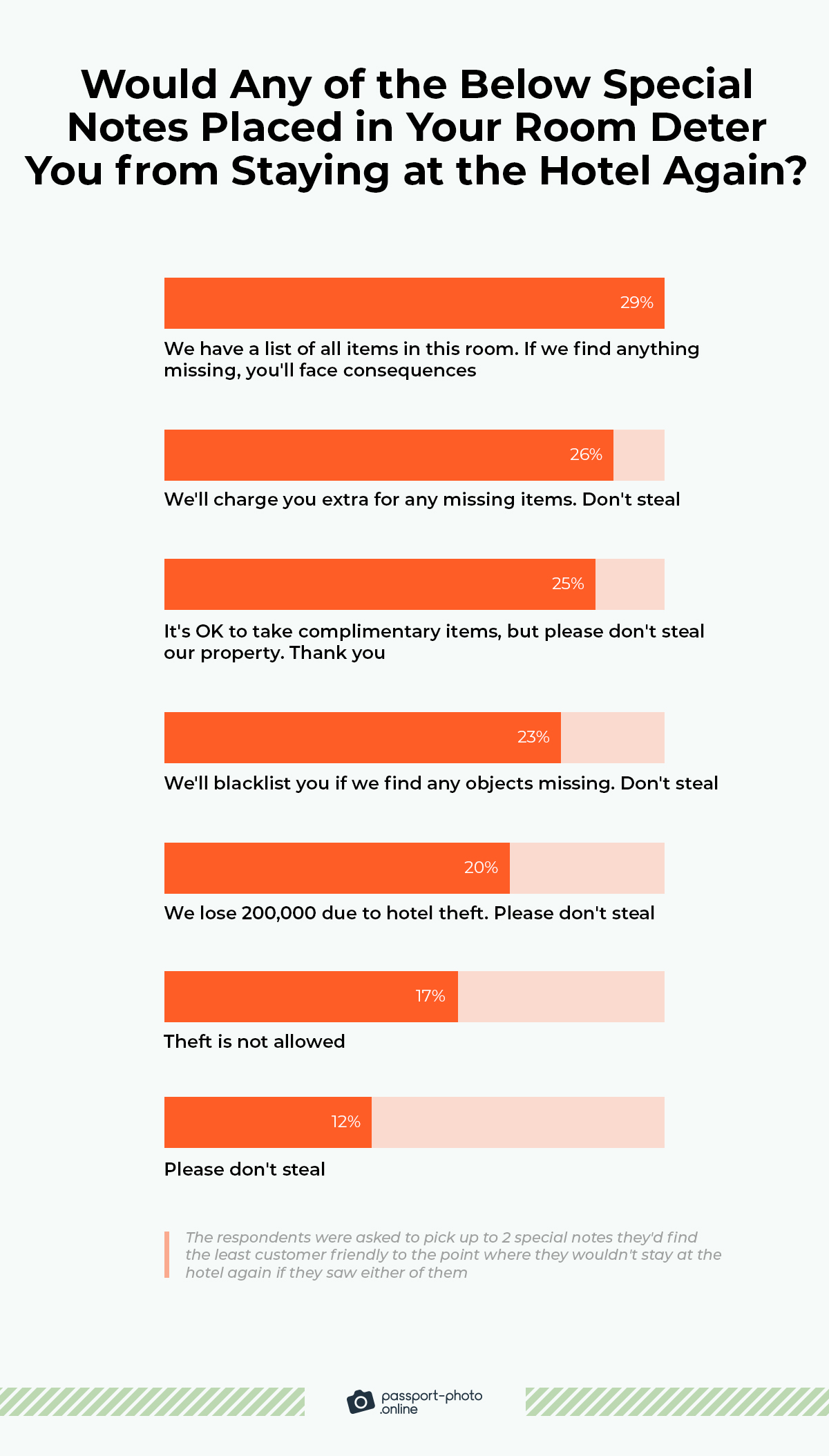
What’s the takeaway?
- People generally are indifferent towards notes like “theft is not allowed” or “please don’t steal.” That means they would probably be both ineffective and inoffensive.
- As much as threatening people may stop them from stealing, it could also prevent them from returning to the hotel.
- Sometimes, being friendly and showing a bit of understanding could lead to more positive results.
That said, it’s just a theory that could be implemented. We’re looking at you, hoteliers!
Stacking It All Up
There you have it.
A comprehensive look at petty hotel theft.
Now—
Do you agree with our findings? Does your own experience match the data? Or maybe there’s something you’d like to add?
Let us know in the comments below.
Methodology
We conducted an online survey of 1,051 US respondents via a bespoke online polling tool in January 2023.
The respondents were 74.4% male and 25.6% female. 8.7% of respondents were 25 or younger, 66.4% were aged 26–38, 21.8% were aged 39–54, and 3.2% were 55 or older.
This survey has a confidence level of 95% and a margin of error of 3%. Given the gender and age makeup of our sample size, the study’s findings are statistically significant for the population at large.
This study was created through multiple research steps, crowdsourcing, and surveying. Data scientists reviewed all survey participants’ responses for quality control. The survey also had an attention-check question.
Fair Use Statement
Did our findings help you learn more about petty hotel theft? If you believe your audience will be interested in this information, feel free to share it. Just remember to mention the source and link back to this page.

Adam is an SEO & Digital PR writer with a child’s curiosity about the surrounding world. His superpower to dig out juicy facts got him citations in Forbes, Social Media Today, and 90+ other news outlets. Adam enjoys snapping pictures and won the national Huawei Next Image Award.
